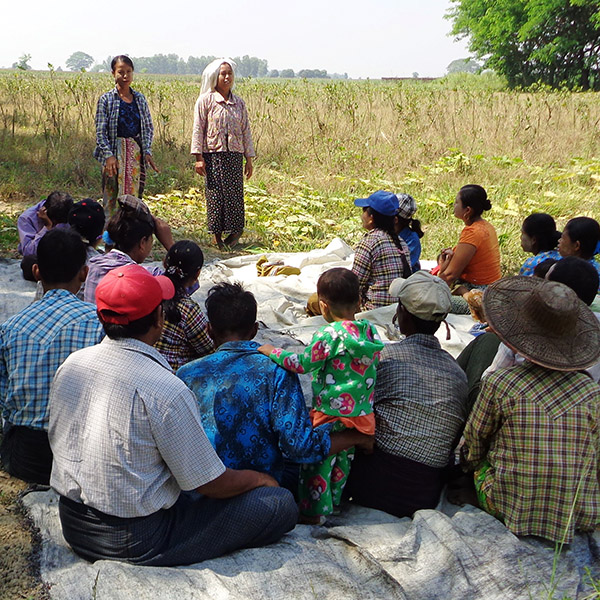Stories of Change

An exchange day visit and presentation.
Through nutrition education, disaster risk reduction and water, sanitation and hygiene programs in 20 villages in two Ayeyarwady region townships, CWS helped 2,431 families – nearly 12,000 people –take steps towards improved well being last year.
Source: CWS Annual Report 2017
A community garden changes lives in Myanmar
Ma Khin San and her husband, U Kyaw Naing Myint, are daily wage farm workers in their community in Myanmar’s Ayeyarwady River region. Together, they are able to earn about $5 per day for about 15 days of work each month during the six-month dry season.
The couple has one daughter, three-year-old Ei Kay Kay Kyaw. She is underweight and too small for her age. To help both the little girl and her parents, a local midwife and CWS staff chose Ma Khin San to join a CWS-led nutrition initiative that helps malnourished young children in very poor villages. This occurs in Maubin Township, where CWS has partnered with local government and communities for several years to address basic community development issues.
When she heard about her daughter’s poor health – and this opportunity to take action to reverse the situation – Ma Khin San stepped up. She joined all eight education sessions led by CWS staff, including ones about home gardening and cultivating a shared village plot with donated seeds and information about gardening best practices. “I was eager to learn, and then I was nominated by friends to be one of the three main keepers of our shared demonstration plot,” says Ma Khin San. “The other two women and I took our new jobs to heart, and we planted watercress, roselle, pumpkin, okra, white radish, cucumber, spinach, salad and coriander. Then we took turns watering and weeding after tilling and plating. So far, we have sold the harvested vegetables to other poor mothers in our Self-Help Group at a low price, which is one aim of our shared work.”
Ma Khin San also cooks come of these vegetables for her own family, since she has learned more about their nutritional value, particularly for little Ei Kay Kay Kyaw. Much of this information was new for her.
Besides bringing more, and better cultivated, vegetables to the village, the demonstration plot keepers also earned $90 from selling vegetables in January through March. They have saved some of the money and seeds for next season. Furthermore, Ma Khin San is now in a position to share her expertise about how organic fertilizer helped improve the demonstration plot’s quality and output. She presented this information to four women’s groups from other villages during a series of learning exchange visits recently.
“This is my first time doing something like this,” says Ma Khin San, “so I am really excited and happy to share my learning and about our achievements, [which we hope to increase] next season when we grow our vegetables with experience and will yield more food and earn more money for our families.”
